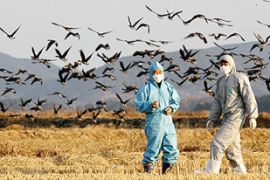South Korea confirms H5N1 outbreak
The country’s agriculture ministry says the bird flu virus has killed 6,000 birds.

Published On 25 Nov 2006
Quarantine authorities also banned the shipment of more than five million poultry from 221 farms within a 10km radius of the farm.
There were no reports to suggest local residents or quarantine officials had been infected, another agriculture ministry official said by telephone.
Global outbreak
Between December 2003 and March 2004, about 400,000 poultry at South Korean farms were infected by bird flu.
During that outbreak, the country culled 5.3 million birds and spent about 1.5 trillion won ($1.6 billion) on preventing the disease spreading, officials said.
Subsequent testing in the US indicated that at least nine South Korean workers involved in the cull had been infected with the H5N1 virus, but none developed major illnesses.
Since 2003, outbreaks have been confirmed in around 50 countries and territories, according to the World Organisation for Animal Health.
North Korea had an outbreak at poultry farms near the capital Pyongyang in February 2005, which led it to cull more than 200,000 chickens and vaccinate 1.1 million poultry.
The World Health Organisation said that as of November 13, there had been 258 cases of human infection of the H5N1 strain since 2003, killing 153 people.
Many of the deaths occured in Asia, with 98 deaths in Vietnam and Indonesia, the WHO said.
Source: Reuters